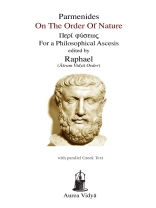With PARMENIDES began what is called, in more specific terms, true Philosophy.
The Eleatic, and his Poem, constitute a ‘beacon’ whose light illumined Plato and even Aristotle, and consequently all the philosophers that followed.
Parmenides laid down several fundamental philosophical principles:
1. The Being as foundation of all the existent
2. The principle of identity, Being is identical to itself
3. The principle of non-contradiction
4. The principle of a-temporality or eternal present
5. An initiatory philosophical vision of an experiential order
For Parmenides the primary aim is the research for the ultimate Truth, and he, Parmenides, has introduced the mortals to the straight path of wisdom:
‘… and here immediately through the gate the maidens steered the chariot and the mares straight onto the road. The Goddess kindly welcomed me and took my right hand in hers and addressing me she uttered so: ‘O young companion, led by the mares and immortal charioteers, you come to our home: rejoice, for no adverse Moira sent you to travel this path – which is far from the way traveled by men – but Themis and Dike’
The transition from one state of consciousness to another higher one, in a completely objectivistic society, is a revolutionary event, and also of this consists Parmenides’ greatness and importance in contemporary life.
Table of Content
Introduction 9
The Way that leads to Being 17
Being 21
Introduction to the Proem 31
ON THE ORDER OF NATURE 41
Fragment 1, Proem 43
Fragments 2 – 7 49
Preamble to Fragment 8 57
Fragment 8 63
Introduction to the world of appearances 71
Fragments 8 (contd.) – 19 87
Notes to the Fragments 99
Bibliographic Reference 117
Glossary 119
Raphael: Unity of Tradition 127
About the author
Raphael having attained a synthesis of Knowledge (with which eclecticism or syncretism are not to be confused) aims at ‘presenting’ the Universal Tradition in its many Eastern and Western expressions. He has spent a substantial number of years writing and publishing books on spiritual experience, and his works include commentaries on the Qabbalah, Hermeticism and Alchemy. He has also commented on and compared the Orphic Tradition with the works of Plato, Parmenides and Plotinus. Furthermore, Raphael is the author of several books on the pathway of non-duality (Advaita), which he has translated from the original Sanskrit, offering commentaries on a number of key Vedantic texts. After more than sixty years of teaching, both oral and written, Raphael has withdrawn into mahasamadhi.












